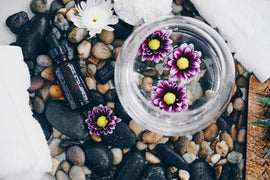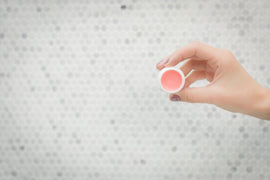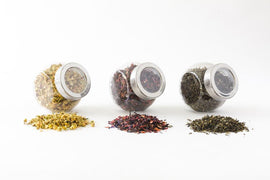- What are Essential Oils?
- What are the different ways to use essential oils?
- How do I store my Essential Oils?
- Essential Oils: Hazards, Warnings, and Guidelines
- Oils to be avoided during pregnancy
- Are your oils organic?
- Can your oils be ingested?
- What are Carrier oils?
- What carrier oil do you use for 3% dilutions?
- What carrier oil do you use for 5% dilutions?
- What are Absolute Oils?
- What are Fragrance Oils?
- What are Hydrosols?
- What are Floral Waters?
- What are the various Methods of Extraction?
- What is an MSDS?
- What is a Certificate of Analysis?
- Are any of your products tested on animals?
- Are the products you carry 100% Natural and Free of Chemicals and Pesticides and Pure?
- What are the differences between therapeutic grade, fragrance grade and even organic essential oils?
- What is the difference between all the various grades?
- Do you send out Samples?
- Do you have recipes and tips available?
What are Essential Oils?
An essential oil is a highly concentrated hydrophobic liquid containing volatile aroma compounds from plants. Essential oils are also known as volatile oils, ethereal oils, aetherolea, or simply as the "oil of" the plant from which they were extracted. An oil is "essential" in the sense that it carries a distinctive scent, or essence, of the plant. The purest essential oils come from carefully cultivated and wild grown plants from climatic and geographic regions throughout the world.
Essential oils are generally extracted by distillation, often by using steam. Other processes include expression or solvent extraction. They are used in perfumes, cosmetics, soaps and other products, for flavoring food and drink, and for adding scents to incense and household cleaning products. Essential oils have been used medicinally in history.
What are the different ways to use essential oils?
Essential oils can be used in many ways:
Massages: Massage is one of the most beneficial methods of using essential oils because it combines the therapeutic powers of the essential oil with the benefits of touch therapy. You can use a variety of oils in a massage blend.
Steam Inhalations: Inhalation is on of the quickest ways to experience the therapeutic benefits of essential oils. People with asthma or epilepsy should avoid inhaling essential oil.
Baths/Sitz baths: Adding essential oils to a hot, soothing bath can create a relaxing and therapeutic experience. You can use them in the shower, saunas and jacuzzis as well.
Skin Care: Essential oils have various therapeutic properties which add zing to any cream, and some of them have very specialized properties to help with skin conditions. If you have never used essential oils, and are prone to allergic reactions, please do a skin patch test with any new ingredient you use.
Hair Care: Although essential oils cannot claim to help with all ills that may befall your poor hair, some of them have been used for centuries to help in making the most of hair. They can be used in your daily hair care regime. It can help others with their hair loss, dandruff, fine hair, dry hair and scalp. Essential oils can be added to shampoo or can be blended (2 drops to 15 ml carrier oil) and used as a compound to do a scalp massage.
Foot and Hand baths: Essential oils have many therapeutic properties that will leave your feet and hands supple and soft. If you have never used essential oils, and are prone to allergic reactions, please do a skin patch test with any new ingredient you use.
Air fresheners and linen mists: Use essential oils to freshen up any of your spaces and environment for a nice bright fresh scents.
Essential Oil Diffuser: Diffusers and Aromatherapy go hand-in-hand. Adding a small a mount of an essential oil to a diffuser effectively introduces the therapeutic properties and fragrance to any environment.
Compress: Compresses are an effective way to apply essential oils directly to areas where they are needed the most. Green Household Products: Use essential oils to clean your house as an alternative solution to household cleaners filled with many chemicals.
How do I store my Essential Oils?
Once you've purchased quality essential oils, it is quite simple to store them for longevity and to ensure that they do not lose their effectiveness. Store them in glass containers. The color of the bottle does not really matter. Some essential oils can actually dissolve in plastic containers, and storing them even temporarily in it may contaminate the oil. Do not store essential oils in dropper bottles either, as it doesn't take long for the rubber seals and squeeze bulbs to melt into a mess. Be sure to keep all essential oils out of direct sunlight and away from heat so they don't lose their potency.
It is recommended that oils should be stored between 0 and 20 degrees Celsius (room temperature). Refrigeration after opening is optimal. Essential oils are natural preservatives and will help preserve your carrier oils. Their scent will change and fade over time, however, and eventually lose its quality. Properly stored, most oils will keep for at least several years. The citrus oils, such as orange and lemon, are most vulnerable to losing their smell, but even they will keep for a couple of years if refrigerated.
Essential Oils: Hazards, Warnings, and Guidelines
General Guidelines
- Read and follow all label cautions and warnings
- Keep out of reach of children and pets
- Do not use on babies, children or pets
- Keep away from flame, heat and ignition sources (essential oils are flammable)
- Do not apply undiluted (neat) essential oils directly onto skin; dilute with a carrier oil first
- Always conduct a patch test of diluted essential oil on the inner arm before using; do not use if redness or irritation occurs
- Do not ingest essential oils
- Keep essential oils out of eyes, ears, nose, mouth and any body opening
- Never assume an essential oil possesses the same properties as its plant
- If you have sensitive skin, epilepsy, heart or kidney problems, or any serious medical condition, do not use essential oils unless advised by a physician or medical professional that it is safe
In Case of an Accident
- If essential oil gets into eyes: Immediately flush with cold milk or vegetable oil to dilute; if stinging persists, seek medical attention
- If essential oil gets on hands: Use cream or vegetable oil to dilute; wash with soap and warm water; repeat if necessary
Special Tips for Massage Therapists
- Prolonged exposure to essential oils can cause headaches, nausea and a general feeling of uneasiness; ensure adequate ventilation, drink plenty of water and take frequent breaks
- Do not operate a motorized vehicle (or allow a client to do so) immediately following a relaxation treatment or after using soporific oils such as clary or sage
- If a given essential oil is used daily over two weeks, allow one week of rest before continuing use
- Vary oils to reduce the chance of acquiring a sensitivity reaction
- Avoid sensitizing oils if hands become sore or cracked
Oils to be avoided during pregnancy
Certain essentials oils are considered too powerful for use during pregnancy as they may stimulate the production of certain hormones and bleeding. Please consult your physician or a reputable aromatherapist before using any essential oil. Some essential oils to refrain from using throughout pregnancy include: Ajowain, Basil, Camphor, Cedarwood, Chamomile, Clary Sage, Cypress, Fennel, Hyssop, Juniper Berry, Marjoram, Rose Geranium, Rosemary and Thyme to name a few.
Are your oils organic?
All of our oils are 100% pure and natural, of therapeutic grade and free from any chemicals or pesticides. Although all of our products are of premium quality, not all of the oils are certified organics. We carry a huge selection of Organic Essential Oils and Organic Carrier Oils that are accompanied by authentic certificates of organic production under strict supervision by internationally recognized certifying bodies.
Some of our teas, herbs, spices and other products are organic as well. Please read the descriptions of each product carefully as they are marked.
Can your oils be ingested?
Our Essential and Carrier Oils are pure, and in many cases, food grade. However, we do NOT recommend the ingestion of essential oils. They are highly concentrated and have the capacity to cause serious damage if used internally without the necessary expertise required in administering it. This is supported by the International Federation of Aromatherapists that does not recommend ingestion of essential oils unless under the supervision of a Medical Doctor who is also qualified in clinical aromatherapy as practiced in France.
What are Carrier oils?
Carrier oil, also known as base oil or vegetable oil, is used to dilute essential oils and absolutes before they are applied to the skin in aromatherapy. They are so named because they carry the essential oil onto the skin. They have extensive applications in Aromatherapy because they are used to dilute Essential Oils or absolutes for application. They are also used in the manufacturing of cold-process soaps and for massage by Licensed Massage Therapists. Carrier oils do not contain a concentrated aroma, unlike essential oils, though some have a mild distinctive smell. Neither do they evaporate like essential oils, which are more volatile. The carrier oils used should be as natural and unadulterated as possible. Many people feel organic oils are of higher quality. Cold-pressing and maceration are the two main methods of producing carrier oils. Each Carrier Oil has different properties and the choice of carrier oil can depend on the therapeutic benefit being sought.
What carrier oil do you use for 3% dilutions?
We use Golden Jojoba Carrier Oil. It will be 97% Carrier Oil and 3% of the real Essential Oil.
What carrier oil do you use for 5% dilutions?
We use Golden Jojoba Carrier Oil. It will be 95% Carrier Oil and 5% of the real Essential Oil.
What are Absolute Oils?
Used in perfumery and aromatherapy, absolutes are similar to essential oils. They are concentrated, highly-aromatic, oily mixtures extracted from plants. They are extracted in a very complex manner that requires the use of chemical solvents that are later removed during the final stages of production.
Whereas essential oils can typically be produced through steam distillation, absolutes require the use of solvent extraction techniques or more traditionally, through enfleurage.
First, an organic solvent, such as hexane, is added to the plant material to help extract the non-polar compounds. This solution is filtered and concentrated by distillation to produce a waxy mass called concrete. The more polar, fragrant compounds are extracted from the concrete into ethanol. When the ethanol evaporates, an oil—the absolute—is left behind.
Absolutes are usually more concentrated than essential oils. Also, the efficiency and low temperature of the extraction process helps prevent damage to the fragrant compounds. With a good understanding of the solvent they are using, extractors can produce absolutes with aromas closer to the original plant product than is possible with essential oils produced through distillation. Also, some botanicals are too delicate to be steam-distilled and can only yield their aroma through other methods, such as solvent extraction or lipid absorption.
What are Fragrance Oils?
Fragrance oils differ from essential oils, which are purely natural distillations or extraction from plants. Fragrant oils are manufactured in a lab from different aromatic chemicals. They are synthetic copies of essential oils, such as rose and jasmine, as well as other scents and aromas people have come to love, like apple pie and piña colada. Cosmetic-grade FO’s may be used alone to scent products, or may be blended with essential oils. However, they have no therapeutic properties, so cannot be used in place of essential oils in aroma therapeutic formulations.
What are Hydrosols?
A Hydrosol is the aromatic water that remains after producing an essential oil via steam or water distillation. Hydrosols are sometimes referred as hydrolats, distillate waters or floral waters. Hydrosols are much gentler than their essential oil counterparts and generally be used directly on the skin. You can use them in lotions, creams, facial toners, skin care products, colognes, body sprays, baths and natural fragrances.
What are Floral Waters?
Floral waters use a process that breaks essential oils into tiny droplets and forces them into de-ionized water. In this process no extra chemicals are used and the scent is true to the essential oil. The scent will also last longer and floral waters can still be used for everything that a hydrosol is used for. Examples of uses of floral waters are,
- Misting your face before moisturizing to soften and hydrate
- Misting your body after the sun
- Use in place of a facial toner for a more gentle clarifying and cooling treatment
- Misting kids to help cool them down
- Add to a cocktail for a delicious scented drink
- Add a splash to a glass of water
What are the various Methods of Extraction?
Cold Pressed:Expression or cold pressing, is used primarily for citrus fruits like orange and lemon, where the essential oil is obtained in tiny pockets in the peel or rind. Oils extracted by cold pressing are the most volatile of essential oils and can evaporate quickly when exposed to air. It is one of the best methods available for extracting the natural essential oil mechanically. It is also known as scarification method where no external heat is required to accelerate the process. The entire heat that is required to carry forward the process is produced internally. However, this method is not preferred for the extraction of vegetable oils but it is highly considered as one of the effective extraction process available.
In this process, oil is extracted from the various fruits, vegetables and seeds by grinding them at a particular temperature. In this method, little pouch containing the essential oil is pricked and after that the whole fruit is squeezed in order to separate the required juice out of the pulp. After that, the most challenging step is performed to separate the essential oil from the extracted juice which is done through the centrifugation process. The oil that is extracted through the cold pressing method has its own fixed life.
Solvent Extraction:
This complex process of extraction is used to separate the components of either liquid or solid. It is also known as liquid-liquid extraction method. The solvent extraction method is widely used in the production of perfumes, biodiesel and vegetable oil. Solvent extraction process is performed by using two distinct liquids together which doesn’t possess a tendency to mix together for instance water and organic solvent.Flowers too delicate to be processed with heat or pressure are soaked in a spirit of solvent that extracts the volatile elements. The solvent is then evaporated at high temperatures, leaving only the most fragrant constituents behind. This process produces what is called an "absolute".
CO2 Extraction:
The CO2 extraction method yields a greater number of aromatic compounds than any other distillation process. In certain conditions, at a low temperature Carbon Dioxide or CO2 can be pressurized to become a liquid. This liquid then acts as a solvent and is used to extract the oil from plants. After extraction is completed, the extraction vessel is brought back to normal temperature and the CO2 rapidly converts to gas leaving behind a high quality oil that is free of solvents.
Steam Distillation Method
The most common process of extracting an essential oil is by distillation, a process that isolates the aromatic, volatile element of the plant with steam. It is a complex process of separating two aromatic compounds. It is also known as separation process in which various organic compounds show the tendency of decomposition at higher temperature. The process of steam distillation is used in order to produce essential oils for the perfume industry. Steam distillation is efficient to separate the intermediate and final products of the organic compounds.
This process is used to extract essential oils from the organic plants by passing generated steam through the plant. The sensitive compounds have a tendency to get decomposed easily at lower temperatures through a simple distillation process, when subjected to steam in distillation department. As a result, this helps in separation of essential oils which is less soluble in boiling water. When steam is passed through the organic compound, the tiny pouches containing the essential oil open up to release the essential oil molecules without causing any harm to the delicate components. The extracted essential oil contain a mixture of water vapor and oil which returns to its liquid form in the condensing apparatus and further separated through using Florentine separator. Steam distillation is the best process to extract essential oil from the aromatic plants.
What is an MSDS?
MSDS is the Material Safety Data Sheet. It is an important component of product stewardship and occupational safety and health. It is intended to provide workers and emergency personnel with procedures for handling or working with that substance in a safe manner, and includes information such as physical data (melting point, boiling point, flash point, etc.), toxicity, health effects, first aid, reactivity, storage, disposal, protective equipment, and spill-handling procedures. MSDS formats can vary from source to source within a country depending on national requirements.
What is a Certificate of Analysis?
A certificate analysis is a document usually issued by an inspection firm attesting to the quality or purity of exported commodities and is the result of testing against acceptable parameters. The document is often required either by the importer or by government regulation in the importing country. It can look quite different from product to product, industry to industry. With Essential oils, the measurement often consists of the dominant constituent of particular oil.
Are any of your products tested on animals?
We do not carry tests on animals for any of our products. Any toxicology information is obtained from MSDS and Certificate of Analysis.
Are the products you carry 100% Natural and Free of Chemicals and Pesticides and Pure?
We have had direct buying relationships with ethical producers and manufacturers around the world for many years. Our buyers regularly visit their facilities and affiliates, and sometimes have the products tested by credible third party laboratories. At Sunrise Botanics, we are committed to continuously improve in this area and selling our clients the very best quality therapeutic Essential Oils, Herbs, Teas and Raw Materials at competitive prices. We take this matter very seriously and have our clients best interest at heart.
What are the differences between therapeutic grade, fragrance grade and even organic essential oils?
It is not simply based on one factor. How the oil is harvested, extracted, and distilled can have a huge impact on the effect of the oil. The slightest temperature and length of time oil is distilled can leave oil non-therapeutic.
When it comes to using oils for healing purposes, only therapeutic grade oils should be used. If oils are distilled with synthetic chemicals or solvents the chemistry of the oil is changed; in the essential oil industry this is called "adulterated".
Once this happens, the oils may smell nice but most if not all of the therapeutic properties are gone; and they are laced with chemicals. This is particularly important if you intend to use them for healing work or in your alternative health practice.
What is the difference between all the various grades?
Organic Grade
- Pure and undiluted essential oils suitable for all applications
- Used in medicinal, aromatherapy, topical, cosmetics, skin care, candles, soap, incense, potpourri, magic, etc.
- Grown, harvested, and processed by organic and sustainable means
Therapeutic Grade
- pure and undiluted essential oils suitable for all applications, but not grown, harvested, or processed organically
Cosmetic Grade
- Is suitable for most applications
- Medicinal use not recommended as they are partially steam distilled and partially formulated in the lab
- Safe for skin, cosmetics, candles, soap, incense, potpourri, etc.
Commercial and Synthetic Grade
- Is not recommended for skin or aromatherapy applications
- It is considered safe for cleaning products, candles, incense, potpourri, etc.
Do you send out Free Samples?
We currently do not offer or ship free samples. Offering free samples and shipping for those samples just means that the cost will be absorbed into our product line which in turn raises the prices for our clients. We offer various sizes for all of our products. Please check our very affordable 5ml sizes which are perfect for testing.
Do you have recipes and tips available?
There are many recipes and tips available daily on our Blog. If you would like to share your own recipe with others, feel free to do so and give us your feedback on our blog; or send it to info@sunrisebotanics.com with your full information so that it may be posted and credited to you.





















































































